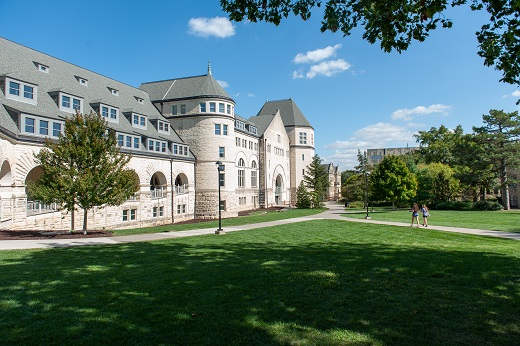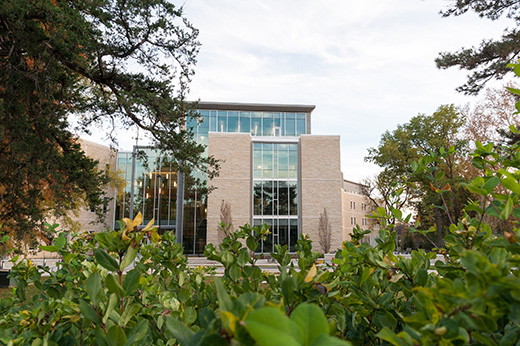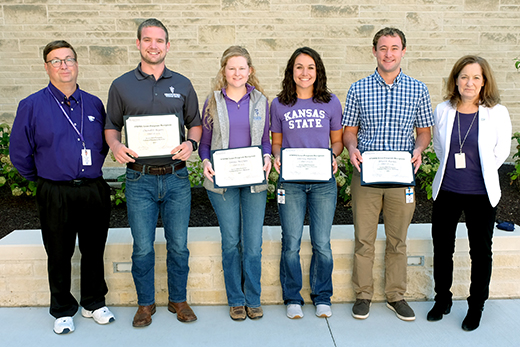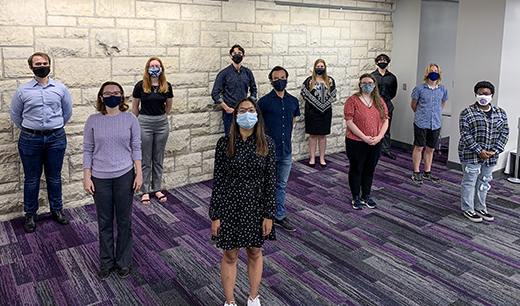K-State Current - October 13, 2021
K-State Current is a weekly news update for the Kansas Board of Regents to apprise the Regents on a few of the many successes and achievements made by K-State faculty, staff and students.
K-State News
New $3.43 million NIH grant to create core research facility at College of Veterinary Medicine
A $3.43 million grant from the National Institutes of Health will help the Kansas State University College of Veterinary Medicine bring together five key laboratories that deal with infectious disease work into one research suite.
Like a hub that connects the spokes of a wheel, the College of Veterinary Medicine is creating a new research center that brings together five highly focused laboratories at Kansas State University. The core laboratory is being made possible by a $3.43 million grant from the National Institutes of Health and will strengthen research efficiency and collaboration among K-State scientists and beyond.
The core-facility suite is the final element of a three-phase renovation at the College of Veterinary Medicine. Phase 1 delivered the Boehringer Ingelheim Auditorium adjacent to Mosier Hall — a 220 seat, contemporary educational space. Phase 2 became the Hill's Pet Health and Nutrition Center for clinical training and community service, which occupies the first-floor space created by deconstruction of the outdated, two-story auditorium. Phase 3, the 5,000-square-foot research laboratory, will occupy the second floor of the old auditorium space.
"This new core research facility strategically combines five key disciplines: animal model/pathology, molecular and cellular biology, microscopic imaging, flow cytometry and cell sorting, and next-generation sequencing," said Bonnie Rush, dean of the College of Veterinary Medicine.
The new research facility represents a critical component of the university's research infrastructure to support infectious disease studies. It will provide direct support of K-State's Center on Emerging and Zoonotic Infectious Diseases, or CEZID, which was created by an $11.3 million grant in 2020 through the NIH's Center of Biomedical Research Excellence, and nearby federal facilities in Manhattan that include the U.S. Department of Agriculture's National Bio and Agro-Defense Facility, or NBAF, and Arthropod-Borne Animal Diseases Research Unit.
"Kansas State University is poised to become the preeminent institution to advance the discovery and development of biosecurity strategies for emerging and zoonotic infectious diseases," Rush said. "With the upcoming deployment of the National Bio and Agro-Defense Facility next to our college, K-State will be the only U.S. university with a full continuum of biosecurity level-1 through biosecurity level-4 facilities co-located on one campus. The new core laboratory will be an important resource for non-containment research."
Currently, existing laboratories are isolated from each other, spread across three buildings and in some cases, hosted by individual faculty members, creating a burden for the host scientist and inefficient workflow for all parties, Rush said. Consolidating these individual facilities into a combined core will improve laboratory access, optimize research workflows and experimental outcomes, and provide coordinated training opportunities for students.
"This will give our university a modern biomedical research facility with advanced instrumentation and technical support to foster collaborative, transdisciplinary science across the university and beyond," Rush said. "This is critical to promoting a robust research and training environment where researchers can answer the most challenging and urgent biomedical questions of our time."
Rush said the latest NIH grant will support CEZID and collaborating scientists to advance the discovery and molecular characterization of infectious pathogens and diseases affecting animals and people. Projects within this new core research facility will bridge areas of excellence across K-State colleges that conduct STEM research. These projects examine cross-cutting themes, such as virulence factors and host-pathogen interactions of pathogens of significance for human health, employing in vitro systems and animal models."
The newly funded, core-facility suite will assemble state-of-the-art technologies in a single location to facilitate the delivery of coordinated services for academic, corporate and federal researchers in imaging and molecular analyses, providing a complete range of services from whole tissues to single-cell nucleic acid analyses. Currently, CEZID has collaborative partnerships with the University of Missouri, Columbia; MRI Global in Kansas City, Missouri; and regional pharmaceutical companies in the Kansas City Animal Health Corridor, such as Boehringer Ingelheim Animal Health in St. Joseph, Missouri, CEVA Animal Health in Lenexa and Elanco Animal Health in Overland Park.
Rush said the proposed plan is to complete renovation and then occupy the consolidated biomedical core facilities by the fourth quarter of 2023.
(Editor's note: The project as described in this announcement is supported by the U.S. Department of Health and Human Services, National Institutes of Health under Award Number C06OD031987. The content is solely the responsibility of the authors and does not necessarily represent the official views of the National Institutes of Health.)
Bachelor's program in finance earns CFA affiliation and new scholarship opportunity for students As a member of the CFA Institute University Affiliation Program, K-State bachelor's students in finance have a new scholarship opportunity.
As a member of the CFA Institute University Affiliation Program, K-State bachelor's students in finance have a new scholarship opportunity.
Kansas State University is now part of the CFA Institute University Affiliation Program. This designation indicates K-State's bachelor's program in finance emphasizes the high ethics and standards set by the institute and is well-suited to prepare students to sit for the chartered financial analyst exam.
"The CFA Institute recognizing Kansas State University and its finance department's curriculum as keeping with these high standards is a great compliment and an incredible honor," said Hardy Johnson, associate professor of finance and interim head of the department. "CFA affiliation means that our students who choose to pursue a degree in this program will acquire the tools necessary to not only compete for these highly sought-after jobs but obtain and excel at them."
The K-State Bachelor of Science in finance provides a high-quality educational experience for students and allows them to pursue careers in a wide selection of industries, including financial management, controllership, financial services, consulting, asset management and more, said Sabuhi Sardarli, associate professor of finance and director of the Gates Capital Management Center for Financial Analysis in the College of Business. The center played a central role in the CFA affiliation process.
Through participation in the CFA affiliation program, K-State finance students are eligible to apply for CFA Program Student Scholarships each year. These scholarships, limited in number, are for finance students interested in earning the chartered financial analyst certification, which has become the most respected and recognized investment credential in the world.
The Gates Capital Management Center for Financial Analysis is now accepting applications for its Finance Scholars Program. This selective program prepares students for careers in high-end investment management, consulting, investment banking and the buy-side of financial markets. To learn more about the application process, visit cba.k-state.edu/financescholarapp.
"As a CFA affiliated institution, the K-State finance department has achieved a major recognition that shows the high quality of our program," said Kevin Gwinner, Edgerley family dean of the College of Business. "CFA affiliation confirms that our finance students have the foundational knowledge to develop into top financial professionals. I commend Dr. Sardarli, Dr. Johnson and our outstanding finance faculty for pursuing and earning this designation of excellence for our finance programs."
The CFA Institute is the global association of investment professionals that sets the standard for professional excellence and credentials.
K-State Faculty Highlights
Kramer awarded grant to establish cross-campus online curriculum for precast concrete
Kimberly Kramer, director of graduate studies and professor in the GE Johnson Department of Architectural Engineering and Construction Science in the Carl R. Ice College of Engineering at Kansas State University, has received a grant from the Precast Concrete Industry Foundation and the National Precast Concrete Association to establish a cross-campus online curriculum for precast concrete.
Kramer will lead the four-year project alongside co-principal investigator Hayder Rasheed, professor in civil engineering at K-State, and collaborator Mohammed Albahttiti of California State University, Chico.
The project itself will utilize resources from the College of Engineering and its counterpart in California to establish an online curriculum in precast concrete while creating an online collaborative model for future studios and programs.
"We want to provide students with a fundamental understanding of practices in the industry through the two proposed courses while connecting students with industry partners," said Kramer, who also holds the G.E. Johnson construction science chair. "This will provide them with a hands-on understanding of precast and prestressed materials and their technology, fabrication, hauling, erection and construction."
Kramer also said the courses will equip students to manage, produce and design precast concrete members, which will encourage students to pursue jobs in this industry.
K-State Student News
College of Veterinary Medicine selects new class of scholars in Veterinary Training Program for Rural Kansas Four Kansas State University veterinary students are recipients of the Veterinary Training Program for Rural Kansas scholarship. From left are James Roush, associate dean for academic programs and student success for the College of Veterinary Medicine, with veterinary students Chandler Rogers, Emma McClure, Chelsey Bieberle and Bryant Karlin, and Bonnie Rush, dean of the College of Veterinary Medicine.
Four Kansas State University veterinary students are recipients of the Veterinary Training Program for Rural Kansas scholarship. From left are James Roush, associate dean for academic programs and student success for the College of Veterinary Medicine, with veterinary students Chandler Rogers, Emma McClure, Chelsey Bieberle and Bryant Karlin, and Bonnie Rush, dean of the College of Veterinary Medicine.
Four new students in the College of Veterinary Medicine at Kansas State University have been chosen for the largest veterinary scholarship program offered by the state of Kansas: the Veterinary Training Program for Rural Kansas.
This year's recipients are first-year veterinary students Chelsey Bieberle, Bushton; Emma McClure, Hugoton; Bryant Karlin, Manhattan; and Chandler Rogers, Topeka.
"The Veterinary Training Program for Rural Kansas fulfills an important educational and service mission for the state of Kansas," said Bonnie Rush, dean of the College of Veterinary Medicine. "These students completed a rigorous selection process. They will complete additional training beyond the curricular requirements of the professional degree program to prepare them for success in rural practice."
The Veterinary Training Program for Rural Kansas was passed by the state Legislature in 2006 to provide a financial incentive to provide rural areas in Kansas with committed veterinarians.
"The program helps retain some of the brightest and best veterinary students in Kansas," Rush said. "The scholarship recipients — past, present and future — create a unique community of supportive colleagues and represent the future of rural veterinary practice in Kansas."
Program participants are eligible for up to $20,000 in loans per year to pay their tuition. Upon completion of their Doctor of Veterinary Medicine degree, each graduate is required to work at a full-time veterinary practice in one of the 91 Kansas counties with fewer than 35,000 residents. For each year the graduate works in rural Kansas, $20,000 worth of loans are forgiven by the state. Graduates are expected to work four years in a designated county to receive $80,000 in loan waivers.
Ninety-six percent of graduates are completing or have completed their loan obligation through service. Graduates who do not complete through service are required to repay the loan. The funds are reinvested through the addition of students to the program. Ninety-three percent of graduates who have completed their four-year obligation remain in a qualifying county. Seventy percent remain in the original practice and community they entered after graduation.
The student scholars spend time during the summer and breaks in the academic year learning about foreign-animal disease preparedness, natural disaster response, rural sociology, small business management and public health. They also will spend three weeks in a rural veterinary practice during their senior year, applying the principles of small business management to rural veterinary practice.
K-State students selected to promote libraries, educate peers The newest members of the K-State Libraries Student Ambassadors, front row, from left: Anastasia Phomchaleun and Teri Jacques; second row, from left: Abigail Whitney, Aaron Middaugh, Brinna Wellington and Justin Castaldi; back row, from left: Carson Krehbiel, Sophia Palcic, Bryan Karten, Victoria Droge and Dakota Kopas.
The newest members of the K-State Libraries Student Ambassadors, front row, from left: Anastasia Phomchaleun and Teri Jacques; second row, from left: Abigail Whitney, Aaron Middaugh, Brinna Wellington and Justin Castaldi; back row, from left: Carson Krehbiel, Sophia Palcic, Bryan Karten, Victoria Droge and Dakota Kopas.
Twelve Kansas State University students have been selected to join the K-State Libraries Student Ambassadors. The ambassadors help promote and advocate for all libraries, including Hale Library.
The new ambassadors will serve two-year terms as representatives for K-State Libraries at social, cultural and recruitment activities. They join 21 students currently serving as ambassadors. The ambassadors provide valuable feedback on K-State Libraries' initiatives and services, as well as advocate for the perspectives of the larger university student body. The ambassador program provides students with leadership skills and the opportunity to make a positive impact at the university. For more information about the program, visit lib.k-state.edu/ambassadors.
The ambassadors were chosen following an application process and finalist interviews. The interview committee included advisers Sara Kearns, academic services librarian; Darchelle Martin, director of communications and marketing; and Nicole Buehler, user services specialist. They were joined by three current ambassadors.
"We are once again ecstatic to welcome such a dedicated, passionate and committed group of students to our program," Martin said. "Their energy has only added to this exciting era for K-State Libraries."
The following students are K-State Libraries Student Ambassadors:
Dakota Kopas, freshman in mechanical engineering, Derby.
From Greater Kansas City: Carson Krehbiel, senior in entrepreneurship, Lenexa; Justin Castaldi, freshman in biology, and Sophia Palcic, junior in mathematics and park management and conservation, both from Olathe; Abigail Whitney, sophomore in English, Overland Park; and Aaron Middaugh, senior in French, anthropology and Spanish, Shawnee.
Victoria Droge, junior in biomedical engineering, Lawrence; Brinna Wellington, freshman in history, Manhattan; Bryan Karten, freshman in open option, Perry; Anastasia Phomchaleun, junior in French, political science and pre-law, Salina.
From out of state: Natalie Liptak, master's student in English, Jacksonville, Florida.
From out of country: Teri Jacques, sophomore in English and mass communications, Port au Prince, Haiti.
